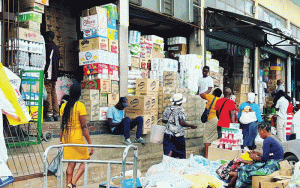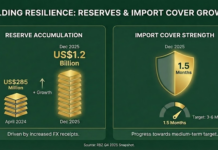
By Kovedzayi Takawira
Harare –The Zimbabwe National Statistics Agency (Zimstat) has revealed that approximately 76.1% of businesses in the country are operating informally.
Speaking at the launch of the Zimbabwe Economic Census preliminary report in Harare today, Zimstat Director for Production Statistics, Matiwonesa Phiri, said the study was conducted nationwide and identified 204,798 operational establishments, of which the majority (76.1%) were informal.
“A formal establishment is defined as one registered with the Registrar of Companies or the Registrar of Cooperatives. However, for this survey, businesses registered with Zimra and NSSA were also considered formal,” Phiri explained.
The report highlighted that wholesale and retail trade dominate the informal sector, constituting 73.23% of establishments, followed by the manufacturing sector at 8.24%.
Bulawayo Province recorded the highest proportion of formalized establishments at 40.4% of 15,840 businesses, while Harare Province had 23.8% of 83,267 establishments classified as formal.
The findings come at a time when some large retailers, such as OK Zimbabwe, have been shutting down outlets due to economic pressures and stiff competition from smaller, informal “spaza” shops.
Commenting on the report, the Confederation of Zimbabwe Industries’ Lead Economic Research Officer, Mcdonald Mutengo remarked
“Numbers don’t lie. With 76% of businesses being informal, it means less than 15% of formal establishments are carrying the tax burden. If we streamline our regulations, cut red tape, and provide incentives for the informal sector to formalize, we might see a shift. At the moment, they have no reason to formalize.”
The Economic Census Mapping fieldwork exercise was conducted from 8 July to 31 August 2024, providing a comprehensive overview of the country’s business landscape.
The high level of informality in Zimbabwe’s business sector underscores the need for structural reforms, tax incentives, and policies that encourage registration.
Experts warn that unless the informal sector is integrated into the mainstream economy, the burden on formal businesses will continue to grow, undermining economic growth and revenue collection.








